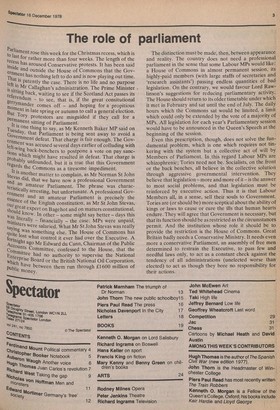The role of parliament
Parliament rose this week for the Christmas recess, which is to last for rather more than four weeks. The length of the recess has aroused Conservative protests. It has been said inside and outside the House of Commons that the Government has nothing left to do and is now playing out time. Illat is patently the case. There is no life and no purpose .eft in Mr Callaghan's administration. The Prime Minister Is sitting back, waiting to see if the Scotland Act passes its referendum — to see, that is, if the great consitutional gerrymander comes off — and hoping for a propitious moment in late spring or autumn to call a general election. but Tory protestors are misguided if they call for a Permanent sitting of Parliament. T It is one thing to say, as Mr Kenneth Baker MP said on nuesdaY, that Parliament is being sent away to avoid a 'fternment defeat. That charge is fair enough. The Govlernment was accused several days earlier of colludingwith Wing backbenchers to postpone a vote on pay sanctions which might have resulted in defeat. That charge is Probably unfounded, but it is true that this Government regards the Commons as a tiresome impediment. sIt is another matter to complain, as Mr Norman St John tevas did, that we have now a professional Government and an amateur Parliament. The phrase was characteristically arresting, but unfortunate. A professional Government and an amateur Parliament is precisely the essence of the English constitution, as Mr St John Stevas, • I °,_Lir great expert on Bagehot and on matters constitutional, Should know. In other — some might say better — days this wa.s literally — financially — the case: MPs were unpaid, intnisters were salaried. What Mr St John Stevas was really s aying was something else. The House of Commons has cfluite lost what control it ever had over the Executive. A AoLrtnight ago Mr Edward du Cann, Chairman of the Public _ecounts Committee, confessed to the House, that the z '-,..,onlinittee had no authority to supervise the National .nterprise Board or the British National Oil Corporation, Which have between them run through £1600 million of public money.
The distinction must be made, then, between appearance and reality. The country does not need a professional parliament in the sense that some Labour MPs would like: a House of Commons in almost permanent session, its highly-paid members (with large staffs of secretaries and 'research assistants') passing endless quantities of bad legislation. On the contrary, we would favour Lord Rawlinson's suggestions for reducing parliamentary activity. The House should return to its older timetable under which it met in February and sat until the end of July. The daily hours which the Commons sat would be limited, a limit which could only be extended by the vote of a majority of MPs. All legislation for each year's Parliamentary session would have to be announced in the Queen's Speech at the beginning of the session. Even this prescription, though, does not solve the fundamental problem, which is one which requires not tinkering with the system but a collective act of will by Members of Parliament. In .this regard Labour MPs are schizophrenic; Tories need not be. Socialists, on the front or the back benches, all believe in the collective solution through aggressive governmental intervention. They believe that legislation —more and more of it —is the answer to most social problems, and that legislation must be reinforced by executive action. Thus it is that Labour Members all, in a sense, sell their souls to Government. Tories are (or should be) more sceptical about the ability of kings or laws to cause or cure the ills that human hearts endure. They will agree that Government is necessary, but that its function should be as restricted as the circumstances permit. And the institution whose role it should be to provide the restriction is the House of Commons. Great Britain badly needs a Conservative Ministry. It needs even more a conservative Parliament, an assembly of free men determined to restrain the Executive, to pass few and needful laws only, to act as a constant check against the tendency of all administrations (unelected worse than elected) to act as though they bore no responsibility for their actions.


































 Previous page
Previous page